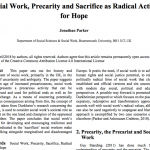HSC has held a practice-changing symposium on Tuesday 16th July to launch its work evaluating child protection processes across Bournemouth and Poole and hopefully Dorset. The multi-stakeholder event expressed the aim to ensure that Eileen Munro’s recommendations that parents, children and young people are at the ‘heart of the work’. (Prof Eileen Munro of LSE was commissioned by the Government in 2010-11 to review child care social work.)
Our research, commissioned by the Local Safeguarding Children Board (LSCB), was undertaken by Richard Williams, Emily Rosenorn-Lanng and Prof Jonathan Parker of the Centre for Social Work, Sociology and Social Policy, in collaboration with the LSCB, Bournemouth and Poole Local Authorities, and latterly including representatives from Dorset County Council.
We were asked to evaluate Bournemouth and Poole child protection processes, child protection strategy planning, core group meetings and the all-important involvement of parents or guardians and children and young people themselves. Unlike many negative and emotionally charged newspaper reports since the serious case review inquiries into the death of Peter Connelly, published in 2008 and 2009 (http://media.education.gov.uk/…./20to%20peter%20connelly%20dated%20november%202008.pdf http://media.education.gov.uk/…/to%20peter%20connelly%20dated%20march%202009.pdf), our research found much in which social workers in the Bournemouth and Poole area can take pride; and much that may resonate elsewhere.
There was considerable evidence of high quality social work and child safeguarding practice. The majority of respondents to our survey (both professional and familial) agreed or strongly agreed that the child protection process has made a positive difference to the family (90.5%). Forty-seven per cent (47%) of children and young people responding, indicated that their feelings of safety rose from 13% to 47% after engagement in the child protection process. Importantly, over 25% of parents or guardians indicated their willingness to contribute further to the on-going evaluation.
Of course, there were elements of the process that indicated areas for development. For instance:
1. Ensuring that minutes of Core Group meetings are disseminated to all involved
2. Ensuring the Core Group follows and monitors the Child Protection Plan
3. Discussing reports fully with Parents and Guardians before the Review Conference
4. Facilitating the involvement of all key people at the Review Conference
5. Monitoring and facilitating the inclusion of the views of Children and Young People continuously
In an innovative approach to change, the day presented findings from the research and explored with social workers, medical and health practitioners, teachers, police officers, managers, and academics to ensure this emotive and complex work was of the highest quality. A commitment was made to continue working together on these matters of great import to children and families, and to addressing some of the areas for development.
Jonathan Parker, Richard Williams, Emily Rosenorn-Lanng
 Social Work, Precarity & Sacrifice as Radical Action for Hope
Social Work, Precarity & Sacrifice as Radical Action for Hope










 REF Code of Practice consultation is open!
REF Code of Practice consultation is open! BU Leads AI-Driven Work Package in EU Horizon SUSHEAS Project
BU Leads AI-Driven Work Package in EU Horizon SUSHEAS Project Evidence Synthesis Centre open at Kathmandu University
Evidence Synthesis Centre open at Kathmandu University Expand Your Impact: Collaboration and Networking Workshops for Researchers
Expand Your Impact: Collaboration and Networking Workshops for Researchers ECR Funding Open Call: Research Culture & Community Grant – Apply now
ECR Funding Open Call: Research Culture & Community Grant – Apply now ECR Funding Open Call: Research Culture & Community Grant – Application Deadline Friday 12 December
ECR Funding Open Call: Research Culture & Community Grant – Application Deadline Friday 12 December MSCA Postdoctoral Fellowships 2025 Call
MSCA Postdoctoral Fellowships 2025 Call ERC Advanced Grant 2025 Webinar
ERC Advanced Grant 2025 Webinar Update on UKRO services
Update on UKRO services European research project exploring use of ‘virtual twins’ to better manage metabolic associated fatty liver disease
European research project exploring use of ‘virtual twins’ to better manage metabolic associated fatty liver disease